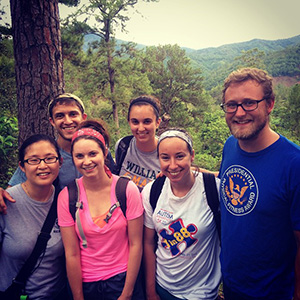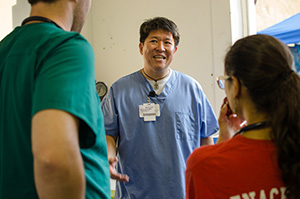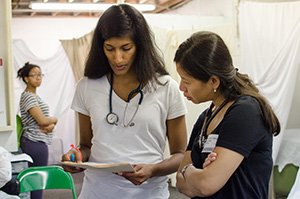
This summer, the Class of 2018’s Kelli McFarling (second from right) traveled to both Honduras and Wise County, Virginia, to help provide health care to the underserved. She was struck by the similarities shared by the patients she met.
The Class of 2018’s Kelli McFarling knew the need for medical care was great in Honduras. But she had no idea how overwhelmed she would feel trying to do her part.
“I know any little dent we can make is a good thing,” said the rising second-year medical student. “But it’s frustrating to see how much needs to be done.”
Kelli was one of about 32 students from the VCU School of Medicine to participate this summer in HOMBRE (Humanitarian Outreach Medical Brigade Relief Effort). Started in 2000, this medical mission trip, organized by first-year students under guidance of faculty from the schools of medicine and pharmacy, takes place the summer before their second year. What began with mission trips just to Honduras has grown over the years to include four sites – Honduras – Norte; the Dominican Republic; Peru; and Honduras – Pinares.
“I learned so much about disease from both a pathological and population health perspective,” Kelli said. “It definitely makes me want to be a doctor even more.”
A few weeks after returning from Honduras, Kelli hit the road again, but this time she remained in the United States. As a member of the RAM (Remote Area Medical) team, she traveled to Wise County with 11 other medical students in July to a temporary clinic that provides free medical, dental and eye care to more than 2,500 patients from 16 states.
DID YOU KNOW?
HOMBRE was first organized as the Honduras Outreach Medical Brigada Relief Effort when students and faculty were traveling only to Honduras. As HOMBRE grew to include more sites, the name changed last year to reflect that growth. HOMBRE is now known as the Humanitarian Outreach Medical Brigade Relief Effort.
“It was an incredible experience to go to both places and see what it was like to be in a third-world country, and then come right back here to Virginia and see the similarities,” Kelli said. “You don’t have to leave the United States to find a need.”
This marked RAM’s eleventh year at Wise. The 12 medical students were among 1,000 volunteers on this year’s RAM team that included physicians, nurses, dentists, pharmacists, podiatrists, respiratory therapists, lab technicians and radiologists.
“Our patients here don’t have access to medical care because the area is so rural,” said Kevin J. Lee, M’09, who led VCU’s RAM team this year. “In addition to not having health care facilities, many can’t afford health insurance, or the insurance they can afford has huge deductibles.”
The three-day clinic is an invaluable experience for students, Lee said, because it takes them outside their comfort zones.

Kevin J. Lee, M’09, has volunteered with Remote Area Medical in Wise County, Virginia, for five years. This summer he led VCU’s RAM team.
“They are seeing things they may not necessarily be exposed to otherwise,” he said. “For example, in school they generally listen to normal heart and lung sounds, or somewhat well managed chronic problems. Here, they tend to hear far more unusual murmurs or lung sounds, as well as complex medical conditions stemming from longstanding untreated chronic medical problems and a significant lack of resources.”
At this year’s clinic, many patients waited in line all day to see a doctor. When they first entered the triage area, they were seen by volunteer nurses. The general medical team then met with them, with third- and fourth-year medical students conducting interviews and evaluations under the supervision of attending physicians. From there, they were either set up with a treatment plan or directed to other specialties.
“I was all over the place,” Kelli said. “I helped with pelvic exams, I helped remove skin lesions and even assisted with tooth extractions. That’s what makes RAM so special – the interprofessional care. It was amazing as a student to have this kind of experience.”
HOMBRE provides interprofessional care as well, with medical, pharmacy and physical therapy students working alongside faculty from VCU’s Medical College of Virginia Campus to treat the medically underserved. This summer, for example, the Dominican Republic team treated about 900 patients over a 10-day period.
“We empower the students to be the primary care providers,” said Mark Ryan, M’00, a site leader for the Dominican Republic team and assistant professor for the Department of Family Medicine and Population Health. “We are asking a lot, but they answer to it. We have a lot of confidence in them.”

Twelve VCU medical students were among 1,000 volunteers on this year’s RAM team. Physicians, nurses, dentists, pharmacists, podiatrists, respiratory therapists, lab technicians and radiologists provided care to more than 2,500 patients from 16 states.
Students worked in pairs. A medical student might have been paired with a pharmacy student, for example, so they could experience team-based care. They conducted patient interviews, performed exams and presented their findings to faculty. They worked as a team to formulate a treatment plan. This approach allows student teams to independently evaluate patients, while ensuring necessary supervision and teaching takes place.
“They are not only providing meaningful service, but come out of it with significant professional growth,” said Ryan, medical director of the Hayes E. Willis Health Center. “They are seeing such a wide range of cases, which really builds their confidence.”
Whether the students are volunteering with RAM or HOMBRE, the cases they see can be quite similar. Patients are often suffering from hypertension, diabetes, high cholesterol, depression, chronic back issues, arthritis and tooth decay. In Wise, where long-term tobacco use is common, many patients also suffer from respiratory issues and even cancer.
“The similarities were shocking,” Kelli said. “In Honduras, I became appreciative of the aspects of health related to infrastructure. Lack of clean drinking water, working plumbing and health literacy were all major factors negatively impacting patients’ health. Lasting impacts in Honduras require more than just a few day’s work. In rural Virginia, the basic infrastructure was in place, but access to health care is limited by costs and distance.”
In both locations, patients return year after year, often seeking out the same doctor or student they saw the year before.
“This summer, a man I see every year came up and gave me a big hug,” said Lee, who has been traveling to Wise for five years. “He had this smile on his face as he told me he had found a job and would have health insurance. He was so proud.
“The best part was he was there this year to sign up as a RAM volunteer. After all those years of being the one in need, he was back to serve. That was so incredible to hear and very emotional for me. What a testament to how much the people in the community feel we are making a difference.”
By Janet Showalter